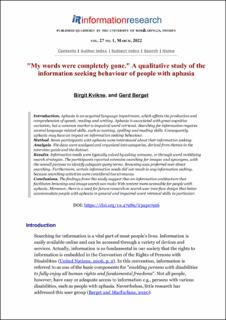| dc.contributor.author | Kvikne, Birgit | |
| dc.contributor.author | Berget, Gerd | |
| dc.date.accessioned | 2022-04-08T15:12:20Z | |
| dc.date.available | 2022-04-08T15:12:20Z | |
| dc.date.created | 2022-03-18T08:49:08Z | |
| dc.date.issued | 2022 | |
| dc.identifier.issn | 1368-1613 | |
| dc.identifier.uri | https://hdl.handle.net/11250/2990804 | |
| dc.description.abstract | Introduction: Aphasia is an acquired language impairment, which affects the production and comprehension of speech, reading and writing. Aphasia is associated with great cognitive variation, but a common marker is impaired word retrieval. Searching for information requires several language related skills, such as naming, spelling and reading skills. Consequently, aphasia may have an impact on information seeking behaviour.
Method: Seven participants with aphasia were interviewed about their information seeking.
Analysis: The data were analysed and organized into categories, derived from themes in the interview guide and the dataset.
Results: Information needs were typically solved by asking someone, or through word mobilising search strategies. The participants reported extensive searching for images and synonyms, with the overall purpose to identify adequate query terms. Browsing was preferred over direct searching. Furthermore, certain information needs did not result in any information seeking, because searching activities were considered too strenuous.
Conclusions: The findings from this study suggest that an information architecture that facilitates browsing and image search can make Web content more accessible for people with aphasia. Moreover, there is a need for future research on search user interface design that better accommodate people with aphasia in general and impaired word retrieval skills in particular. | en_US |
| dc.language.iso | eng | en_US |
| dc.publisher | University of Borås | en_US |
| dc.relation.ispartofseries | Information research;Vol. 27, No. 1, March, 2022 | |
| dc.rights | Attribution-NonCommercial-NoDerivatives 4.0 Internasjonal | * |
| dc.rights.uri | http://creativecommons.org/licenses/by-nc-nd/4.0/deed.no | * |
| dc.subject | Aphasia | en_US |
| dc.subject | Language impairments | en_US |
| dc.subject | Information seeking behaviour | en_US |
| dc.subject | Information needs | en_US |
| dc.subject | Cognitive skills | en_US |
| dc.subject | Information architecture facilitating | en_US |
| dc.title | "My words were completely gone." A qualitative study of the information seeking behaviour of people with aphasia | en_US |
| dc.type | Peer reviewed | en_US |
| dc.type | Journal article | en_US |
| dc.description.version | publishedVersion | en_US |
| cristin.ispublished | true | |
| cristin.fulltext | original | |
| cristin.qualitycode | 1 | |
| dc.identifier.doi | https://doi.org/10.47989/irpaper916 | |
| dc.identifier.cristin | 2010707 | |
| dc.source.journal | Information research | en_US |
| dc.source.volume | 27 | en_US |
| dc.source.issue | 1 | en_US |
| dc.source.pagenumber | 22 | en_US |

